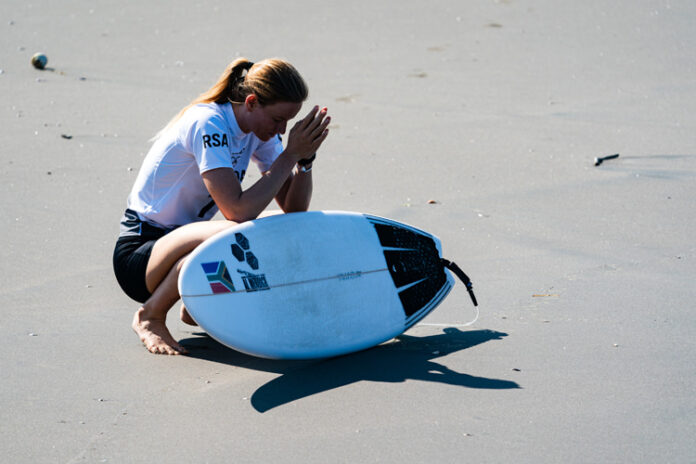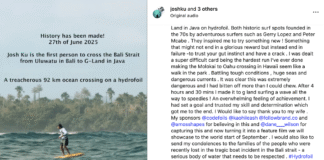“I would sacrifice a world title for a gold medal.” The heartfelt words are from seven times world surfing champion Stephanie Gilmore.
The purists will always be purists. For them, surfing doesn’t belong in the Olympic Games. It’s a perfectly valid opinion.
There’s even a minority that doesn’t even see surfing as a sport. The same applies to skateboarding. It’s understandable, and every reasonable surfer gets the message.
I don’t share the same point of view, and neither did Duke Kahanamoku.
The father of modern surfing was above any suspicion. The Duke was never a professional surfer like the ones that we have today.
Instead, he promoted the sport/practice of riding waves for the pleasure of it, even when it meant being ostracized for the color of his skin.
Kahanamoku understood what the Olympic movement means.
The Hawaiian represented the United States and won five medals for his country in three Olympic Games.
He embraced the simple yet timeless values of Olympism: excellence, friendship, and respect.
These three core principles should be enough to promote sports and help build a better world. Duke adopted them into his life and shared them with everyone who met him.

A Great Start
The inclusion of surfing in the Olympics is something that should make surfers proud.
Although it is no longer only an amateur-only global competition, it is the only collective gathering that truly allows amateurs to compete against professionals and still dream of clinching gold, silver, and bronze medals.
With all its flaws and occasional historical setbacks, the Olympics are one of the few moments in the time when sportsmen and sportswomen from all over the world compete, side by side, against each other and share their culture with their peers.
Unlike in professional sports circuits, athletes are not in the Olympic Games to cash a check. Instead, they feel what’s a stake – the pride of representing their flag and eventually listening to the national anthem.
Surfing made its Olympic debut in Tokyo 2020.
Japan delivered perfectly surfable waves and, unlike some stars of the sport had predicted, there was no need to hold the competition on a wave pool.
Olympic surfing triumphed on its inaugural event.
Was it perfect? No. There were no video highlights, meaning that only a small percentage of the world population saw it live.
But it was a great start.
I look forward to watching Olympic surfers promoting the original values of the sport, its intimate connection with Nature, and its healthy lifestyle for years to come.
And I have an alibi. In 30 years of surfing, I have never wanted – or felt the need and impetus – to compete.
I don’t think my surfing would improve or express itself the way I want it to, in a competitive two or four-man heat.
However, my personal preference does not necessarily imply a disgust for surf contests or professionalism.

Surfers Truly Felt the Olympics
I was also impressed by the thoughts expressed by those who lost and won at Tsurigasaki Beach.
Italo Ferreira, the world’s first men’s Olympic surfing gold medalist, said: “I truly believe that the Olympics will change our lives.”
John John Florence may not have reached the podium, but he “would love to see surfing in many more Games in the future.”
Owen Wright secured the bronze medal. But he dreams of gold in Paris 2024 before putting an end to his career. “That’s my goal – that’s the way I want to end it.”
The opportunity to compete with the Olympic jersey was also the perfect moment for Bianca Buitendag to retire from professional surfing. “I felt like this would be the perfect opportunity for closure,” the silver medalist stated.
Carissa Moore, the winner of the women’s Olympic gold medal, felt that “as a Hawaiian, seeing Duke Kahanamoku’s dream come true to have surfing in the Olympics is super special.”
Julian Wilson skipped the last professional surf contest at a wave pool to prepare for the Olympics. And announced he would be leaving the tour after Tokyo 2020.
Long live Olympic surfing, and may the universal values of wave riding help build a better world.

Surfing as a Reality Show
While Olympic surfers proudly wore the Olympic rings, gave their best, and waved their countries’ flags, a new reality show unveiled its official trailer.
“The Ultimate Surfer,” a TV series developed by World Surf League (WSL) and ABC, will feature 14 male and female surfers training and living together at the Surf Ranch in Lemoore, California.
The reality show’s format is clear.
“Alliances and rivalries will be front and center in ‘The Ultimate Surfer’ (…) with weekly eliminations,” the official press release notes.
In the end, the winning male and female surfers will get a wildcard into the Championship Tour (CT).
There’s an obvious question that immediately comes to mind. How do hundreds of Qualifying Series (QS) surfers feel about this?
Why should a QS be traveling the world – winning, losing, winning, and losing – when there are people who can experience the elite of surfing via a reality show?
“The Ultimate Surfer” features a good-looking, all-white cast that may certainly conquer the hearts of many fans of the TV genre.
And, surprisingly or maybe not, the show will have the greatest competitive surfer of all time serving as “lead consultant” and “special correspondent.”
Surfing as a Content-Based Business
We could criticize the inclusion of surfing in the Olympic movement and, there are, as we’ve seen, valid and rational arguments that support that conviction.
But if the Olympic Games unveil the heart, spirit, and essence of surfing, what will a reality show – fueled by its love-and-hate, like-dislike formula – do to the sport?
Will it bring more people into surfing? Or will it make surfers less proud of what they’ve accomplished in the past 100 years?
Social media has already taken part of the magic away from each ride.
The professional surfing circuit admitted that its business model is and will be anchored on content-based strategies.
Surfing could be destined to become a slave to the way it looks and increasingly less attached to what it feels like.
But that’s just my point of view. What’s yours?
Words by Luís MP | Founder of SurferToday.com





